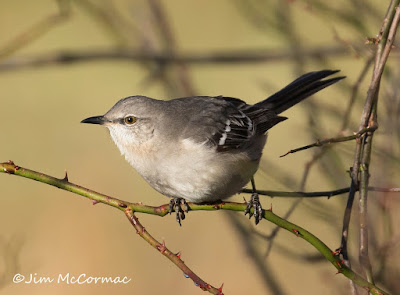Yesterday marked the date of the Hocking Hills Christmas Bird Count (CBC), and as for the past many years, I was there. It was my fifth and final CBC of the season, which is about an annual average for me. For what it's worth, I've done nearly 130 CBC's in total. That's a lot of bird counts, but I started when I was pre-driver's license kid. Still have a ways to go to catch the all-time Ohio CBC record holder, which is Ernie Limes, who participated in a remarkable 246!! counts. If I stick to my current pace, it would take about 24 years to surpass Ernie's record. Hmmm, we shall see, but it is certainly possible.
Anyway, enough of trivial record-setting braggadocio, and on to something interesting as pertains to yesterday's CBC...
My helper this year was Kim Smith, from the northerly land of Toledo. It was her first time in the Hocking Hills region, and I think she was enthralled with the forests, meadows, and rolling to rough hills of this country. Not to mention the overall birdiness of the region. You can check her blog out RIGHT HERE.
A northern mockingbird rules over the thorny shrubs from a sprig arching high over his fruit-laden plants. He scarcely blinked when we pulled in next to him. Mockingbirds are hardly shrinking violets, and the animal was not particularly bothered by our arrival.
The mockingbird jumped to this nearby rusting gate at one point, the better to eye the new arrivals. However, he was far more interested in a nearby large pack of eastern bluebirds. A dozen or more of the gorgeous open-country thrushes were feeding nearby, but the bluebirds also indicated interest in the mockingbird's rose-hip rich rose shrubs. The mimic was having none of that, and occasionally tore after the "gentle" little thrushes, making it clear who ruled this rosy roost. Bluebirds, avid frugivores that they are, would relish the chance to plunder the mockingbird's larder. Good luck to them with that - a mockingbird is about ten times more aggressive and hostile than even the meanest bluebird. Our Mimus polyglottos easily kept the bluebirds at bay, even outnumbered as he was.
When not fending off interlopers, the mockingbird entered the thorny depths of the large rose bushes and picked off rose hips. The small fruit are nutritious and keep well over winter. Many fruit-eating birds relish them.
Multiflora rose, as you are probably aware, is not native to North America. It is indigenous to eastern Asia, but was introduced and naturalized in North America long ago. It apparently first arrived in the 1860's for use as an ornamental. By the 1930's, its use as an erosion control plant and wildlife resource was widely encouraged. Forewarnings regarding the rose's invasive nature were being sounded by the 1960's, but various governmental agencies and other organizations pushed the plant's alleged virtues well past that time.
There is certainly far less multiflora rose around these days - at least in Ohio - and there are several reasons for its decline. The upshot is that less multiflora rose is a good thing for outcompeted native plants and habitats, and no one should miss it. But as is often the case, even thorns have their roses, and a positive of this plant is that certain bird species do benefit from its fruit and dense cover. Mockingbirds and wintering white-crowned sparrows are two notables, and whenever I come across multiflora rose hedges in winter, I can usually expect to find some interesting birds.




2 comments:
Thanks for this post, Jim. Mockingbirds have been scattered around the Cleveland area - especially close to Lake Erie - for quite a while and are gradually becoming more common elsewhere in the Cleveland region. As a professional musician, I have great respect for these highly-accomplished singers!
Thanks, Lisa. It’s been interesting watching mockers increase their occupation of northern lands. I remember when they were very rare anywhere along Lake Erie. Not so much these days. I was stunned to see one on Bonaventure Island in Quebec last summer! And I too respect these feathered musicians and their vast repertoire!
Post a Comment